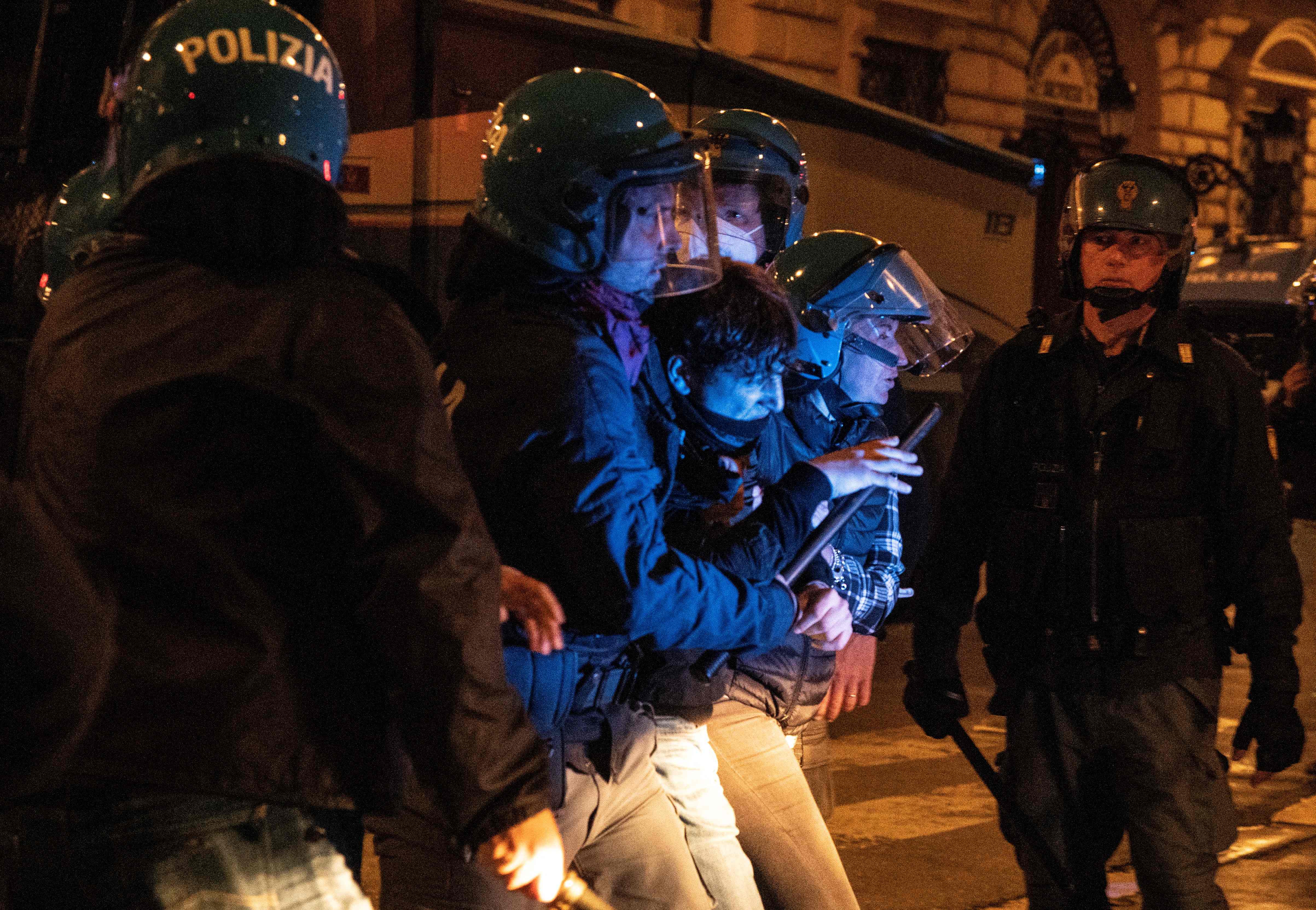‘Today is a day of anti-fascism’: Protesters fill Rome as Covid rules stoke political tensions
Italy’s ‘Green Pass’ caused angry demonstrations last weekend, prompting fears over the rise of the far-right. On Saturday, thousands protested against fascism

Helicopters hovered over Rome today as thousands of people rallied in the Italian capital to protest against last week’s attack by members of the far-right on a trade union.
What began last weekend as a peaceful demonstration against a government drive to make the Covid-19 passport mandatory for all workers, spiralled into clashes and an assault on Italy’s leading trade union CGIL’s building, while others tried in vain to reach prime minister Mario Draghi’s office.
Twelve people were arrested, including the leaders of the far right party Forza Nuova, fuelling fears of a resurgent fascist movement in a country that still bears the scars of Benito Mussolini’s dictatorship.
“We’re taking to the streets because a week ago, after many years, we were forced to backtrack 800 years when the labour union was attacked – it was a terrible sign for the country’s democracy,” Gianna Fracassi, deputy secretary general of the left-leaning CGIL labour union, told The Independent.
Men, women and children of all ages and from all corners of the country streamed through Rome’s city centre and packed into Piazza san Giovanni in Laterano, where people gathered under the imposing eponymous church and sang along to the popular partisan song “Bella Ciao”.

“Italy never reckoned with fascism… it’s still within the state,” said protester Limo DeAngelis, 67. “[Last week’s attack] was an attack on the constitution.”
According to event organisers, 800 buses, 10 trains and a handful of airplanes shuttled thousands to the capital and while most wore face masks, social distancing was not an option in the packed square. This didn’t stop the more vulnerable members of society from attending.
“I’m here because I still have memories of [fascism] from when I was a child,” said 79-year-old Giampiero, the oldest member of his family to wake up at 3am to embark on a seven-hour bus journey from Piedmont to Rome.
Retired schoolteacher Anna di Monte, 68, made the two-hour bus journey from Teramo in the eastern province of Abruzzo. “I wanted to be here because right-wing groups are progressing.”
A stone’s throw away, standing next to her husband, Stefania Manetti, 63, sported a red bandana with the slogan of the day: No more fascisms. “We’re here to defend the anti-fascist spirit,” she said, getting lost in a sea of reds, blues and greens – the colours of Italy’s three leading trade unions.
“It was right to immediately put in place a strong, decisive response against the assault on the CGIL headquarters, after a long crescendo of violence, threats and vandalism against all Italian confederal trade unionism,” said Luigi Sbarra, the secretary of the Cisl workers union, in a statement.
From Brussels the international trade union IndustriALL tweeted in support of the march: “When democracy is under attack, trade unions are the first to be hit. Today we mobilise everywhere in Europe in solidarity with our Italian colleagues and against fascism.”
The coming together of Italian and international workers unions also gave way to an unusual moment of political unity when both the centre-left and the populist Five Star Movement called for a single, anti-fascist, movement.
Italy never reckoned with fascism… it’s still within the state
However, the ongoing politicisation of Italy’s coronavirus measures is expected to cause more rifts between the country’s MPs and lead to a repeat of last week’s clashes. The new Green Pass measures, which came into effect on 15 October, have sparked a renewed wave of countrywide, albeit limited, anti-Green Pass protests.
In what has been deemed one of the toughest Covid-19 measures in the world, prime minister Draghi’s government has now made it mandatory for private and public sector workers to have a Covid-19 passport – dubbed the Green Pass – in order to go to their workplace.
This means workers must have received at least one vaccine dose, recovered from the virus, or tested negative within 48 hours. Workers who choose to go to work without a Green Pass can be suspended without pay and risk fines of up to 1,500 Euros.
While Italian watchers warned of the potential infiltration of neo-fascist elements in today’s march, the unions were confident that the security protocol was stronger than ever and that security forces across the peninsula were guarding sensitive targets, including embassies, labour headquarters and government buildings.
There are no security concerns, said CGIL deputy secretary general Gianna Fracassi: “Today is a day of sunshine and anti-fascism.”
Join our commenting forum
Join thought-provoking conversations, follow other Independent readers and see their replies
Comments


Bookmark popover
Removed from bookmarks